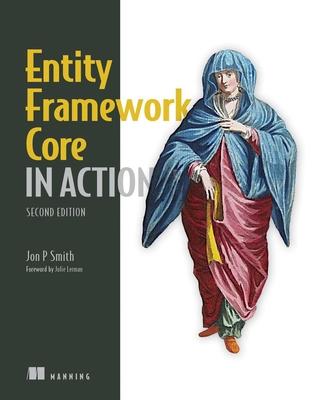
Entity Framework Core in Action, Second Edition is an in-depth guide to reading and writing databases with EF Core. Revised from the bestselling original edition, it's filled with over 100 diagrams, code snippets, and examples--including building and scaling your own bookselling web application. Learn from author Jon Smith's extensive experience working with EF Core in production, as you discover time-saving patterns and best practices for security, performance tuning, and unit testing. All of the book's code is available on GitHub. Purchase of the print book includes a free eBook in PDF, Kindle, and ePub formats from Manning Publications. About the technology
Entity Framework radically simplifies data access in .NET applications. This easy-to-use object-relational mapper (ORM) lets you write database code in pure C#. It automatically maps classes to database tables and enables queries with standard LINQ commands. It even generates SQL, so you don't have to! About the book
Entity Framework Core in Action, Second Edition teaches you to write flawless database interactions for .NET applications. Following relevant examples from author Jon Smith's extensive experience, you'll progress quickly from EF basics to advanced techniques. In addition to the latest EF features, this book addresses performance, security, refactoring, and unit testing. This updated edition also contains new material on NoSQL databases. What's inside Configure EF to define every table and column
Update your schema as your app grows
Integrating EF with existing C# application
Write and test business logic for database access
Applying a Domain-Driven Design to EF Core
Getting the best performance out of EF Core About the reader
For .NET developers familiar with relational databases. About the author
Jon P. Smith is a freelance software developer and architect with a special focus on .NET and Azure. Table of Contents PART 1
1 Introduction to Entity Framework Core
2 Querying the database
3 Changing the database content
4 Using EF Core in business logic
5 Using EF Core in ASP.NET Core web applications
6 Tips and techniques for reading and writing with EF Core
PART 2
7 Configuring nonrelational properties
8 Configuring relationships
9 Handling database migrations
10 Configuring advanced features and handling concurrency conflicts
11 Going deeper into the DbContext
PART 3
12 Using entity events to solve business problems
13 Domain-Driven Design and other architectural approaches
14 EF Core performance tuning
15 Master class on performance-tuning database queries
16 Cosmos DB, CQRS, and other database types
17 Unit testing EF Core applications
Entity Framework Core in Action, Second Edition is an in-depth guide to reading and writing databases with EF Core. Revised from the bestselling original edition, it's filled with over 100 diagrams, code snippets, and examples--including building and scaling your own bookselling web application. Learn from author Jon Smith's extensive experience working with EF Core in production, as you discover time-saving patterns and best practices for security, performance tuning, and unit testing. All of the book's code is available on GitHub. Purchase of the print book includes a free eBook in PDF, Kindle, and ePub formats from Manning Publications. About the technology
Entity Framework radically simplifies data access in .NET applications. This easy-to-use object-relational mapper (ORM) lets you write database code in pure C#. It automatically maps classes to database tables and enables queries with standard LINQ commands. It even generates SQL, so you don't have to! About the book
Entity Framework Core in Action, Second Edition teaches you to write flawless database interactions for .NET applications. Following relevant examples from author Jon Smith's extensive experience, you'll progress quickly from EF basics to advanced techniques. In addition to the latest EF features, this book addresses performance, security, refactoring, and unit testing. This updated edition also contains new material on NoSQL databases. What's inside Configure EF to define every table and column
Update your schema as your app grows
Integrating EF with existing C# application
Write and test business logic for database access
Applying a Domain-Driven Design to EF Core
Getting the best performance out of EF Core About the reader
For .NET developers familiar with relational databases. About the author
Jon P. Smith is a freelance software developer and architect with a special focus on .NET and Azure. Table of Contents PART 1
1 Introduction to Entity Framework Core
2 Querying the database
3 Changing the database content
4 Using EF Core in business logic
5 Using EF Core in ASP.NET Core web applications
6 Tips and techniques for reading and writing with EF Core
PART 2
7 Configuring nonrelational properties
8 Configuring relationships
9 Handling database migrations
10 Configuring advanced features and handling concurrency conflicts
11 Going deeper into the DbContext
PART 3
12 Using entity events to solve business problems
13 Domain-Driven Design and other architectural approaches
14 EF Core performance tuning
15 Master class on performance-tuning database queries
16 Cosmos DB, CQRS, and other database types
17 Unit testing EF Core applications
Paperback
$59.99